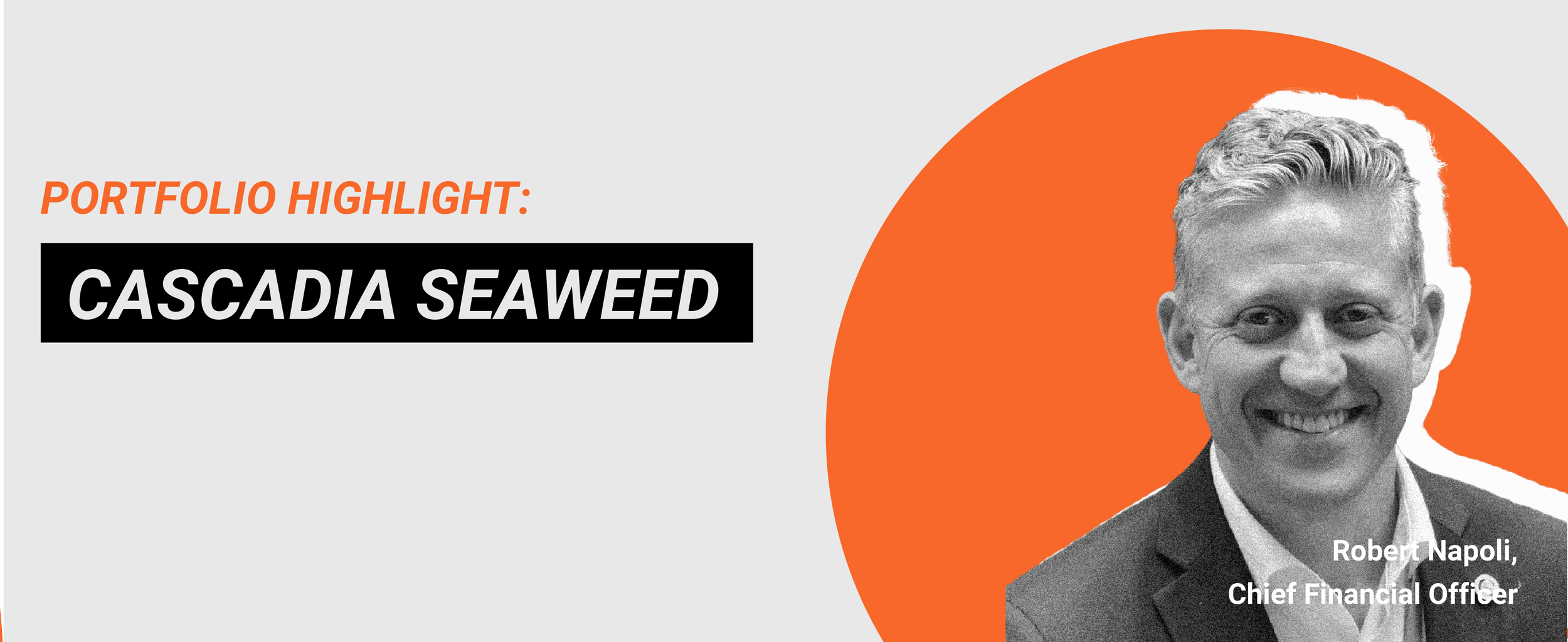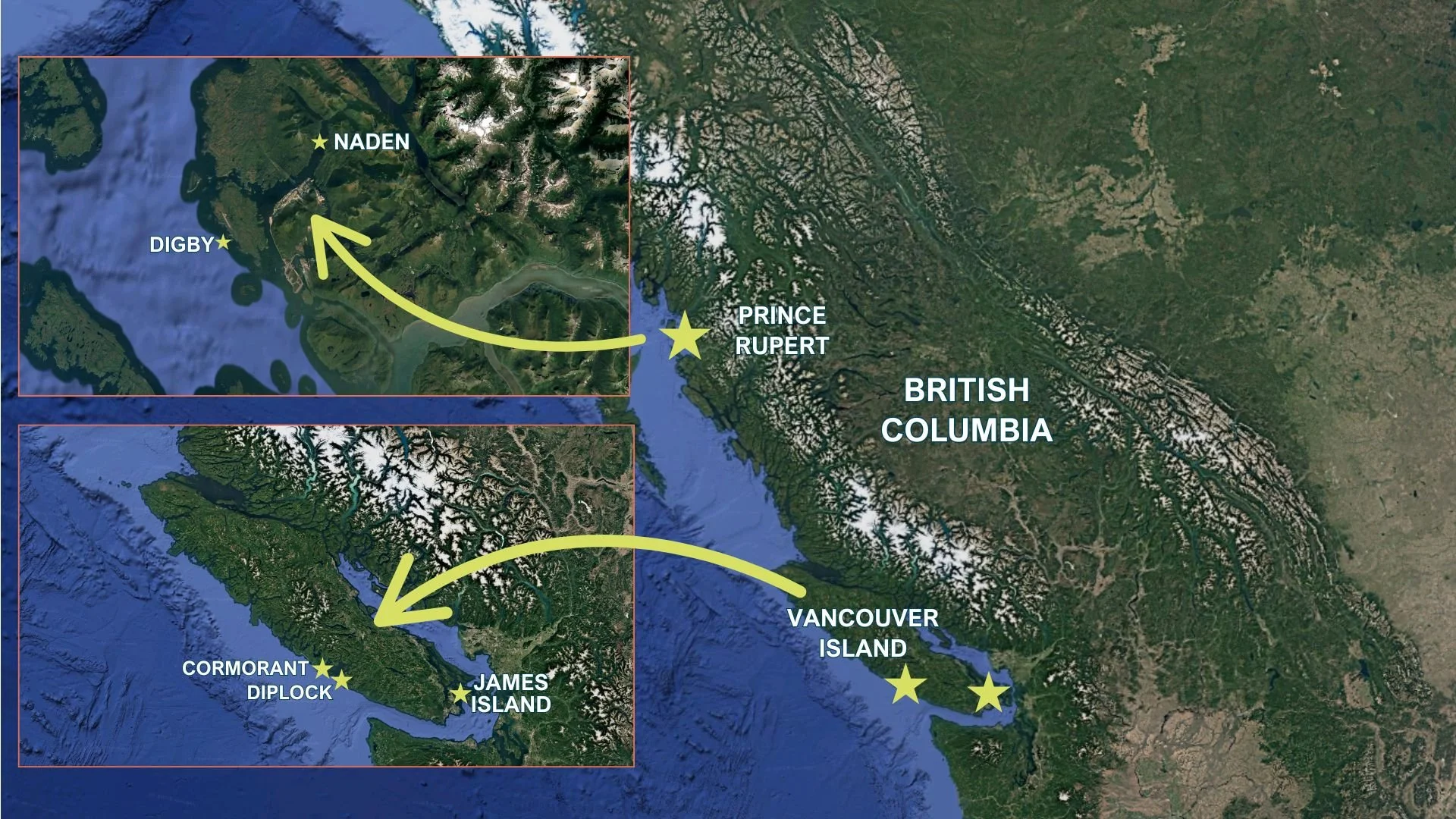Portfolio Highlights: Cascadia Seaweed
In this installment of our Portfolio Highlight series, we are diving into the work of Cascadia Seaweed, a sustainable aquaculture company producing high-quality biostimulants derived from regeneratively harvested seaweed. Cascadia Seaweed's goal isn’t just about the product; it focuses on developing climate-resilient cultivation methods while prioritizing the environment.
Read below to hear from Chief Financial Officer, Robert Napoli about how the cultivation of seaweed is going to change the world — and how Cascadia Seaweed is making sure that this natural resource is not only combating the climate crisis, but also giving back to the very communities from which the seaweed is harvested.
VERTUELAB: What was the inspiration to start Cascadia Seaweed? What specific problems does Cascadia Seaweed solve for?
Robert Napoli (left) and Michael Williamson (right) holding Alaria Marginata
NAPOLI: In 2018, [Director and founding partner] Bill Collins was developing business cases to attract foreign direct investment to Vancouver Island, one of which was sustainable aquaculture. While discussing this opportunity with [Cascadia Seaweed CEO] Michael Williamson, who was exploring ideas for his next venture, the two connected over a shared vision. Together with the late Tony Ethier, they recognized the potential to create a scalable business that enhances the natural environment while generating economic opportunities for Indigenous and coastal communities. In June 2019, Cascadia Seaweed was born.
Today, Cascadia Seaweed focuses on three Impact Areas: Ocean Impact, Regenerative Agriculture, and Community Livelihoods.
Commercially, we address key challenges for agricultural producers through our liquid kelp extracts. Our products help crops withstand abiotic stresses, such as drought and flooding, improve soil health, and increase fertilizer efficiency, enabling producers to reduce synthetic inputs, lower emissions, and minimize environmental harm.
As a vertically integrated company, we oversee the full production process from cultivating sustainable seaweed in the ocean on marine farms owned by coastal First Nations, which provide localized ecosystem benefits, to using chemical-free processing technology to produce liquid kelp extracts. In doing so, we connect sustainable aquaculture to regenerative agriculture, and help solve some of the world's most pressing challenges.
At VertueLab, we emphasize place-based climate tech, supporting organizations that source solutions to the climate crisis on a local scale. Can you expand on Cascadia Seaweed’s partnership with First Nations and the importance of your continued collaborations with Indigenous communities throughout the harvesting and development process?
Support from coastal First Nations is essential to the long-term success of the seaweed industry, particularly seaweed aquaculture. For Cascadia Seaweed, our relationships with Indigenous communities are built on shared values, economic opportunity, and responsible oversight of a growing sector. This includes acknowledging and respecting territorial rights and supporting communities in managing their coastal ecosystems.
We are proud to have two Nations as shareholders in Cascadia Seaweed, one of which publicly celebrated their investment. (news story) Each relationship and agreement is unique, reflecting the individual needs, goals, capacity, and interests of the Nation involved.
Cascadia Seaweed farm map
All of Cascadia’s marine farms (pictured left) are leased to us by a coastal First Nation partner. The upstream operational activities, which involve our First Nation partners, include conducting site surveys, installing infrastructure, planting seeds, monitoring growth, and harvesting, often with active participation from the local Nation, or a First Nation owned business, particularly site selection, where their historical knowledge is invaluable.
We are also leasing a building for a new, large processing facility in Northern BC, where one of our First Nations partners is also the landlord.
Beyond our farms, through Cascadia Nature-based Solutions, we collaborate with Nations and communities worldwide on kelp restoration, biodiversity monitoring, engineering innovations, and value-chain development, further connecting sustainable marine practices to community and environmental benefits.
Cascadia Seaweed recently announced its partnership with Kenyan “she-weed” farmers. What is the implication of expanding your involvement in the seaweed market globally, and why are seaweed biostimulants such an exciting path for agrotech?
In July 2025, Black Press highlighted our work with the Conservation and Sustainable Management of Coastal and Marine Ecosystems (COSME) project, which began in March 2023.
Beyond producing liquid seaweed extracts for agriculture, Cascadia operates a services division, Cascadia Nature-based Solutions, offering expertise in kelp restoration, biodiversity monitoring, value-chain development, and engineering innovations.
Leveraging our experience as the largest vertically integrated seaweed cultivator in North America, Cascadia Nature-based Solutions serves as a technical contractor on the COSME project, leading research, market development, engineering innovation, and providing technical assistance to women-led seaweed production, harvesting, and marketing initiatives in coastal Kenya.
Seaweed cultivation in Kenya represents a significant, underutilized opportunity for economic development and agricultural innovation. Traditional markets—industrial food ingredients and consumer products like soaps and cosmetics—face limitations, including low seaweed content, strict quality standards, limited economic returns, and price volatility. Seaweed-based biostimulants provide a compelling alternative: they use higher volumes of seaweed, require less stringent quality standards, and focus on serving domestic agricultural needs.
Globally, the seaweed biostimulant market is growing rapidly, with seaweed as the largest subcategory of biostimulants, expanding at roughly 14% per year. As governments worldwide work to reduce agricultural emissions and strengthen food security, sustainably cultivated seaweed offers a scalable solution. Different seaweed species contain unique compounds that address specific crop challenges, creating significant opportunities for research and development of liquid seaweed extracts tailored to agricultural markets around the world.
Green Gravel Outplanting with Snuneymuxw First Nation
How has your partnership with VertueLab benefited Cascadia Seaweed?
VertueLab’s Climate Impact Fund I provided valuable credibility to our Series A fundraising efforts as a recognized impact venture capital fund. Leveraging their name, as well as other prominent investors in the round, such as WWF Impact Fund, Vere Ventures and Potato Impact Partners, helped us to attract other investors. We are now looking to close the round oversubscribed. In addition, the investment helped to leverage non-dilutive, matching grant funding from NRC Cleantech Fund and NorthX, as well as debt financing from Farm Credit Canada.
Why is it vital to fund and support clean and climate-equitable agro-tech companies like Cascadia Seaweed?
Funding climate-equitable ag-tech companies like Cascadia Seaweed is vital, as agriculture is both a major driver of climate change and a sector with enormous potential for solutions. Cascadia Seaweed is uniquely positioned to address climate impacts in the ocean through sustainable cultivation and on land through its products, offering nature-based, scalable technologies that help farmers reduce emissions, improve soil health, and increase resilience to climate-related stresses such as drought and flooding.
Investing in these solutions accelerates the transition to regenerative practices that produce food more sustainably while supporting local economies. For Cascadia, this includes creating economic opportunities for coastal and Indigenous communities, supporting restoration and biodiversity initiatives, and linking sustainable marine cultivation with regenerative agriculture.
Supporting Cascadia Seaweed helps scale solutions that are good for the planet, good for communities, and ultimately, strengthen the resilience of our food systems.
What’s next for Cascadia Seaweed?
Cascadia Seaweed is scaling up production of liquid seaweed extracts, targeting a 6× increase in sales, and positioning itself as a market leader in the agricultural sector. We are developing a long-term testing and trials program to ensure our products address specific challenges for large-scale food producers in North America, while remaining easy to use and cost-effective.
To support these goals and maintain a reliable, consistent supply, we are nearing completion of a new commercial processing plant, refining cultivation and harvesting techniques for Macrosystis, a brown seaweed rich in valuable compounds, expanding our marine-farm footprint in Northern BC, and sourcing seaweed from other cultivators. These steps not only strengthen our production capacity but also help build a sustainable market for seaweed farmers.
Thanks for joining us for this installment of our Portfolio Highlights! Head to https://www.cascadiaseaweed.com/ to learn more about the incredible aquaculture and regenerative harvesting done by Cascadia Seaweed.
To support them, and similar climate-tech entrepreneurs, consider making a tax-deductible donation to VertueLab today. With recent rollbacks in federal policies and funding for climate and diversity initiatives, your support is more vital than ever to our work in providing support to entrepreneurs developing solutions to the climate crisis. Your generosity brings us closer to a more resilient, equitable, and just climate future.




